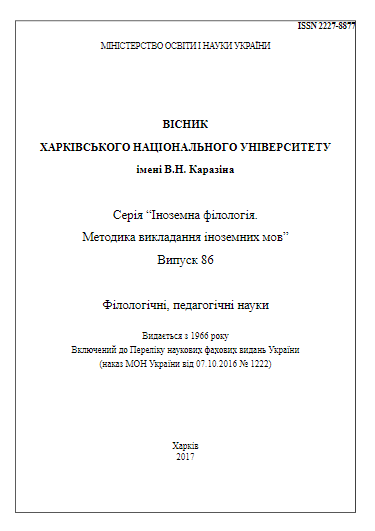Eptonyms by O. Wilde in the German Language: Ecolinguistic Approach
Abstract
This article focuses on the phenomenon of eptonymization within the framework of the ecolinguistic approach. Ecolinguistics provides for the consideration of the language as a unity of its internal structure and natural, social, psychological and regional environment. Eptonyms result from the influence of cognitive, social and cultural factors of adapting new semiotic phenomena to the existing linguistic environment and are defined as initially freely functioning quotations which acquired the status of fixed units overtime, presuppose awareness of the authorship by the communicants and are subject to derivative processes. The translingual strain of ecolinguistics studies the processes of adapting phenomena from one language to the functional environment of another, thus, the English eponyms under consideration (namely, those authored by Oscar Wilde) are a case of translingual adaptation described in terms of ecolinguistics. The paper aims at determining conceptual and translational factors which allow for the foreign quotation adaptation in the German-language environment and its entrenchment in the German eptonymic sphere of concepts.
The study brings to light the configuration of concepts verbalized in eptonyms by O. Wilde in the German language; it also covers the translation methods for revealing the way foreign quotations acquire an adapted eptonymic form in the German language. At the core of the eptonymic sphere of concepts of O. Wilde in the German language is the megaconcept PERSON dominating the hierarchy of subordinate concepts such as BIOPHYSIOLOGY, PSYCHICS, SOCIAL STANDING and BEHAVIOR. Most eptonyms activate the concepts WOMAN-MAN, COGNITION, MORAL QUALITIES, ART, SOCIETY.
The translational factors for adapting eptonyms by O. Wilde include the following: phonetic and imitative (alliteration, paronymy), morphological and categorial (nominalization), lexical and semantic (metaphorization, specialization of meaning, synonymy), sentential (expansion, reduction) transformations.
Downloads
References
Бернацкая А.А. О трех аспектах экологии язика [Электронный ресурс] / А.А. Бернацкая // Вестник КрасГУ. – 2003. – № 4. – С. 32–38. – Режим доступа : http://www.russian.slavica.org/article433.html
Бессмельцева О.В. Язык и воспитание личности / О.В. Бессмельцева // Экология языка на перекрестке наук : материалы 2-й международной научной конференции : в 2 ч. – Ч. 2. – Тюмень : Изд-во ТюмГУ, 2012. – С. 91–99.
Дядечко Л.П. Крылатые слова как объект лингвистического описания: история и современность / Л.П. Дядечко. – К. : Изд-во Киев. ун-та, 2002. – 293 с.
Как нарисовать портрет птицы : методология когнитивно-коммуникативного анализа языка : кол. монография / [Бондаренко Е.В., Мартынюк А.П., Фролова И.Е., Шевченко И.С.]; под ред. И.С. Шевченко. – Х. : ХНУ имени В.Н. Каразина, 2017. – 246 с.
Кияк Т.Р. Теорія і практика перекладу німецької мови / Т.Р. Кияк, A.М. Науменко, О.Д. Огуй. – Вінниця : Нова Книга, 2006. – 592 с.
Кушнина Л.В. Экология перевода: культура VS природа / Л.В. Кушнина, П.Р. Юзманов // Экология языка на перекресте наук : материалы науч. конф. – Тюмень : ТюмГУ, 2010. – С. 39–45.
Оніщенко Н.А. Ептоніми як засіб формування комунікативної компетенції: когнітивно-дискурсивний підхід / Н.А. Оніщенко // Сучасні фундаментальні теорії та інноваційні практики навчання іноземної мови у вузі : кол. монографія / під ред. В.Г. Пасинок. – Х. : ХНУ ім. В.Н. Каразіна, 2013. – С. 191–218.
Скрябіна В.Б. Екологія перекладу як новий напрям / В.Б. Скрябіна // Науковий вісник ДДПУ імені І. Франка. – № 3. – 2015. – С. 245–249.
Федюченко Л.Г. Экологический аспект перевода: переводческая ошибка / Л.Г. Федюченко // Вестник Тюмен. гос. ун-та. – 2012. – № 1. – С. 97–102.
Blackledge A. Language ecology and language ideology / A. Blackledge // Encyclopedia of Language and Education / A. Creese, P. Martin, N.H. Hornberger (Eds.). – Volume 9: Ecology of Language, second ed. – Berlin : Springer Science+Business Media LLC, 2008. – P. 27–40.
Duden. Zitate und Aussprüche / Hrsg. Günther Drosdowski. – Bd. 12. – Mannheim, Leipzig, Wien, Zürich : Dudenverlag, 1993. – 827 S.
Fill A. The ecolinguistics reader: language, ecology, and environment / A. Fill, P. Mühlhäusler. – New York, 2001. – 291 p.
Haugen E. The Ecology of Language / E. Haugen. – Stanford, CA : Stanford University Press, 1972. – Р. 324–329.
Kenyon K. Oscar Wilde / K. Kenyon // British Heritage. – June 12, 2006. – Available at : https:// britishheritage.com/oscar-wilde/
Kohlmayer R. Oscar Wilde in Deutschland und Österreich: Untersuchungen zur Rezeption der Komödie und zur Theorie der Вühnenübersetzung / R. Kohlmayer. – Tübingen : Niemeyer, 1996. – vi, 452 S.
Steffensen S.V. Ecolinguistics: the state of the art and future horizons [Electronic resource] / S.V. Steffensen, A. Fill // Language Science. – 2013. – Access mode : http://dx.doi.org/10.1016/j.langsci.2013.08.003
The Reception of Oscar Wilde in Europe / Ed. by S. Evangelista. – London : Bloomsbury Publishing, 2010. – lххv, 490 р.
Wer hat's gesagt: Karl Lagerfeld oder Oscar Wilde? Zwei Seelen, ein Gedanke [Electronic resource]. – Available at : http://www.madame.de/karl-lagerfeld-zitate-794012.html




